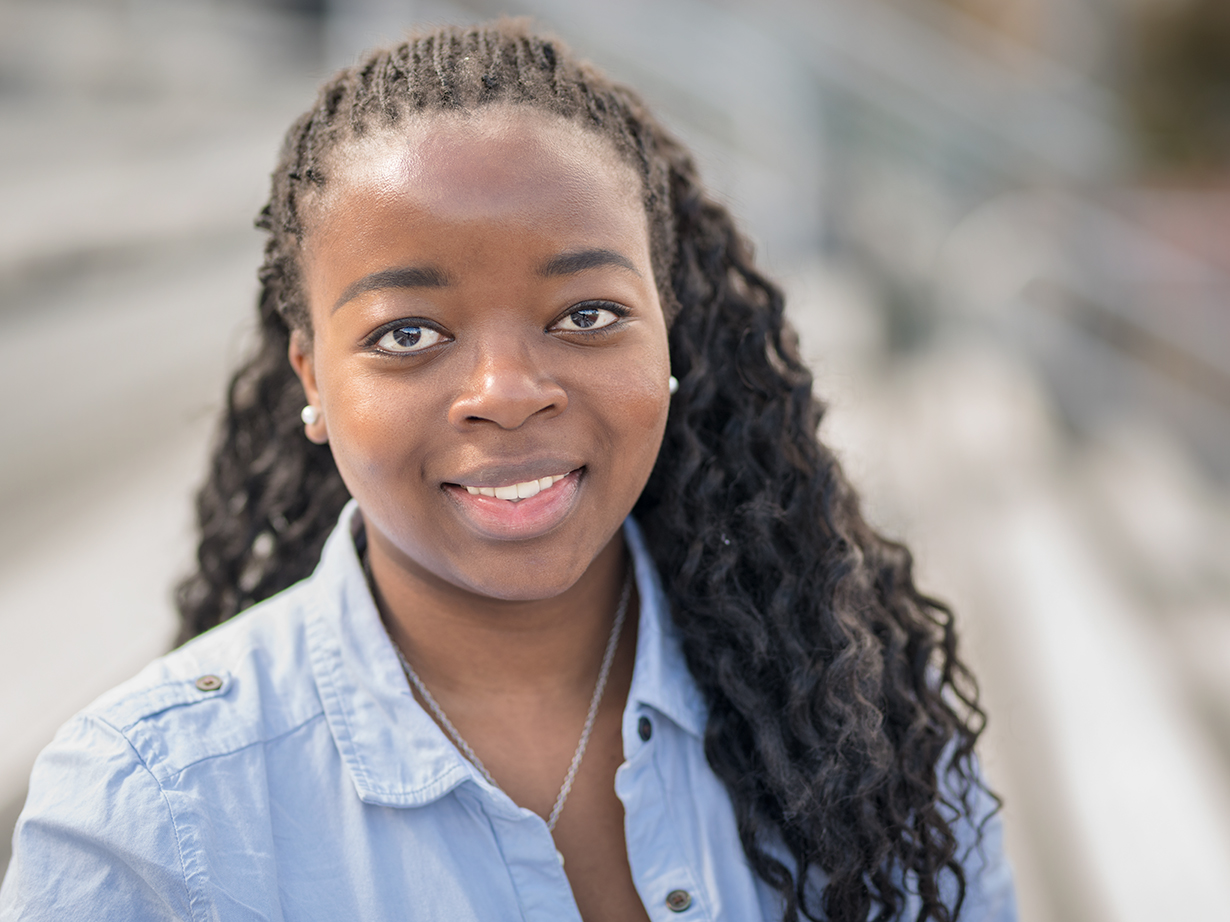It was her birthday, an especially happy one because she got to see her mom. Johana Amani and her sister rarely saw their mother because they were living with their father. But on that day, when she was 6 or 7, her mother came to see them at school, wrapping a traditional garment around Johana’s waist and making her a proud Congolese woman.
Amani is happy that she was born on International Women’s Day, March 8, 2000, near Goma, Democratic Republic of the Congo. “In Congo it’s a really huge celebration. Women wear their traditional clothes and they cook food and dance — it’s an amazing, happy day,” she explains.
Her mother, a professional with degrees in Business and French, had to give up her business career because it was not acceptable in Congo for married women to work outside the home. Her father was a high-up, local politician whose obsession with power turned to abuse of family members. When Amani was three years old, her mother left the marriage. The law, almost more like punishment, was so harsh that she lost custody of her two daughters.
After her mother left, Amani said she suffered physical and sexual abuse from male relatives. Often, she witnessed her father abuse her stepmother. “There is a cultural expectation that whatever happens in the family stays at home. We don’t talk about it,” she comments.
When Amani was 10 years old, her mother showed up one night outside the gate to their father’s mansion. Perched on the back of a motorcycle with a driver she had hired, she told Amani and her sister to get on behind her. They left with just the clothes on their backs.
The two girls jumped on the motorcycle and didn’t look back. It was a long ride to catch a bus and cross the border into Rwanda. Not until they were on the bus did their mother tell them, “Look in the mirror and say goodbye to all your problems.”
In Rwanda, her mother left the girls with a friend and went back to the Congo to pick up some money and clothes. When she returned two days later, bloody and with ripped clothes, she told them she had been attacked at the border by someone who worked for Amani’s father. She moved the family to another part of Rwanda, and after a few months, to Kenya.
There Amani’s mother worked as a tailor and the girls attended a nearby school, where they had to learn English. Amani started her first job working in a milk shop at age 13 to help support her family.
After six years in Kenya, Amani’s family was approved for asylum in the U.S. with refugee status. But still afraid of her father finding them, they asked to be placed somewhere without a large Congolese population. “We were scared that word would get out that we were in the U.S.,” she explains.
On September 22, 2016, Amani’s family arrived in Portland, Oregon.
Since starting school at Roosevelt High School, Amani skipped her junior year, has a 3.8 GPA, and is set to graduate this spring. Besides participating in several organizations that assist other African students, she works full time at Burgerville.
One of her teachers introduced her to his wife, a civil engineer who had done some of the new construction at Roosevelt. “From there, I met other women who did architecture, which I liked even more,” she explains.
She has received scholarship offers from both University of Oregon and Portland State University and plans to double-major in architecture and public policy management and minor in business.
Amani says that witnessing her mother’s struggle with oppression has inspired her own empowerment. She wants other African women like herself to know that they can be successful.
“I want to challenge the perspective that women should only do feminine stuff. I want to do something different that most people don’t expect me to do, and see how it works out,” she says.
In five years, she hopes to be a college graduate working to bring systemic change to countries like Congo, where educational opportunities for girls and women remain limited.
Looking ahead to her future, Amani declares, “This is all just the beginning.”


2 thoughts on “The Architect of Her Own Future”
Such a brave girl, and now woman! So glad you’re here my sister! Much love to you and so much hope for the lives you touch!
She is such a brave woman and my role model…big love amani
Comments are closed.